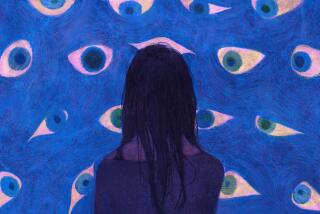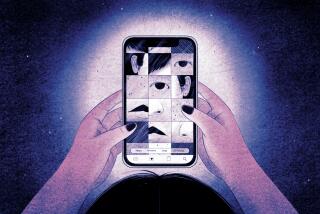Oh, Those Times When We Come Unzipped
- Share via
* A man was chased at high speeds for 30 minutes last month by four police cars and a helicopter attempting to stop him for a traffic violation. He called the police on a cellular phone during the pursuit to explain why he wasn’t pulling over: He was wearing women’s clothes.
* In June, a teenage tagger was high above the San Diego Freeway when the sun started coming up. Suddenly concerned that someone would spot him up there, he jumped--and fractured his spine.
What drove these people to such behavior? In a nutshell: the fear of embarrassment, an exquisitely painful frailty from which no one is immune.
It comes with a rush of involuntary physiological responses: blushing, sweating, stuttering and even the occasional tossing of one’s cookies (talk about embarrassing). It can cause us to act impulsively as emotion short-circuits rational thought.
It results when others see or hear things that we wish they hadn’t: an unzipped fly (for the record, I have never seen anything through a gaping fly), food in the teeth, a stumble to the ground, verbal gaffes, toilet paper trailing from shoes or out of skirts, and innumerable other things.
Psychologists and sociologists say that human beings, like all social mammals, respond to anything that threatens to lower their status in the group.
“As social animals, we are very vulnerable to how people perceive us and judge us,” says Andre Modigliani, a psychology professor at the University of Michigan. “Embarrassment is the involuntary acknowledgment that others have noticed you [and] that notice is negative.”
“When animals are confronted with danger, they either run or, pushed to the wall, they turn and fight,” says Edward Gross, professor emeritus of sociology at the University of Washington at Seattle and author of “Embarrassment in Everyday Life” (ETC Publications, 1994). “There is a third thing: They go stock still and rigid.
“This happens in humans. Embarrassment is this massive, powerful emotion that stops everything. It tells you to pay attention. . . . You are doing something wrong.”
Embarrassment is not life-threatening, but avoiding it can be. Modigliani tells of an incident 30 years ago when a pilot was alarmed by a noisy engine. He called for mechanics, who came and worked on the plane’s motor for 20 minutes in view of passengers seated inside the plane. Suddenly, the pilot went down to the mechanics, argued with them, threw his hands up and waved them away. He then revved up the motor and took off.
Modigliani says that not one passenger got off the plane--apparently they were too embarrassed. “Getting off would have meant asking the stewardess to put down the stairs to let them off, and no one even asked,” reports Modigliani, who says this incident inspired him to investigate embarrassment systematically. “People would literally rather die than be embarrassed.”
In some cases, they would even kill to avoid it. Gross cites an autobiographical account by George Orwell:
Orwell was serving as a British official in Burma when an elephant got loose and killed a man. The elephant was found feeding calmly in the public market, where Orwell shot him--even though he preferred to leave the beast alone until its caretaker could be found.
Orwell said he felt he had little choice. “To come all that way, rifle in hand, with 2,000 people marching at my heels, and then to trail feebly away, having done nothing. . . . No, that was impossible. The crowd would laugh at me.”
After shooting the elephant, Orwell said he “often wondered whether any of the others grasped that I had done it solely to avoid looking like a fool.”
To look like a fool, or oafish or incompetent sullies our public image and personal esteem, says Gross. Take the case of a foreign diplomat who, while sitting on a couch at a diplomatic reception, noticed his open fly. According to Gross’ account, the diplomat hunched over to zip it, catching both ends of his tie in the zipper’s teeth. He then tried to leave, but the tie tightened round his neck as he stood up. The hostess handed him scissors; he snipped the tie, and ran off with the two pieces fluttering from his zipper.
(The moral of the story: Wear button flys.)
As Mark Twain put it: “Man is the only animal that blushes. Or needs to.”
Blushing--caused by a widening of the small blood vessels and a rise in skin temperature--is an involuntary response. It usually is immediate, Gross says, and lasts up to 15 seconds.
Embarrassment also is accompanied by gestures of hiding: hands covering the face, downcast eyes, burying the head in one’s arms or lap or in a neighboring shoulder (in lieu of burying it in a sand dune).
Mercifully, there are ways to recover from embarrassing blunders. Common face-saving techniques are to (a) apologize, (b) offer excuses, (c) pretend it didn’t happen (and hope that everyone else will, too) or (d) laugh it off with a bon mot. This, of course, requires composure in the face of humiliation.
If, for instance, one trips in public and lands on the ground, Gross offers this response from Peter Sellers as Inspector Clouseau: “I see there’s nothing of interest on the floor, so I’ll take a seat.”
Maybe laughter will diminish the sting.
More to Read
Sign up for Essential California
The most important California stories and recommendations in your inbox every morning.
You may occasionally receive promotional content from the Los Angeles Times.













